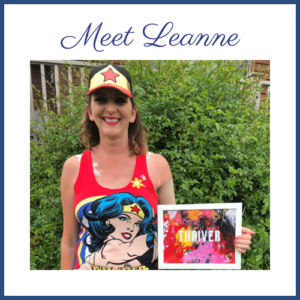Many women with lobular breast cancer have found the Lobular Breast Cancer Alliance (LBCA) after they were diagnosed. They want to help build a community among peers, to share the most current information about ILC detection, treatment and clinical trials, and to raise awareness about this common yet understudied breast cancer subtype that needs more research. Sharing their stories is one of those ways.
Meet Leanne
My name is Leanne. I am 55 years old and live on a horse farm in Nova Scotia, Canada. I have one daughter and one grandson. I am a writer, which is something I can do from bed, as my brain metastasis will not allow me to ride and work horses anymore. I was diagnosed with metastatic lobular breast cancer on April 4, 2018.
I was originally diagnosed with lobular breast cancer in September 2015. I woke up one morning with a very painful, swollen and inflamed left breast, but no lump. After many tests involving ultrasound, mammogram, biopsies, and doctors manually feeling it, I was given the diagnosis. My family doctor told me I had Stage 3 triple positive (ER+, PR+, HER+) invasive lobular carcinoma (ILC).
At the time, those words meant nothing to me. I had absolutely no experience with cancer and wasn’t aware of all the subtypes. After I was able to get the initial shock and fear under control, I set out to educate myself. Knowledge is power. And I needed all the power I could muster to fight this beast. Imagine my surprise when I discovered that there are a wide variety of subtypes just for breast cancer alone! And they all affect treatment plans.
I signed up for as many emails as possible. I joined every Facebook group that was relevant to cancer. I participated in various cancer-focused events.
Finding LBCA
I found and shared information from the Lobular Breast Cancer Alliance’s website, lobularbreastcancer.org, to my Facebook page. I am also involved with the Metastatic Breast Cancer project, which is a part of Countmein.org and supported by the Broad Institute out of Harvard University.
I believe that most people are not aware of these subtypes and how they can affect treatment plans. I also believe that when a person is given a cancer diagnosis, they need to educate themselves. I am on top of new research and clinical trials. Doctors are busy with long patient lists. We must, as patients, advocate and research for ourselves.
The Lobular Breast Cancer Alliance website has been a great source of information for me. It is so informative regarding research and clinical trials. Because I live in Canada, it may take a while for these US-approved treatments to reach Canada, but at least I know what is out there on the horizon. Sometimes I have even educated my oncologists.
In closing, I would like to say that ILC is not necessarily a harder cancer to treat. (They are all hard. Cancer is cancer.) But it is a harder cancer to detect. I didn’t even know that I was developing cancer until it was already well advanced.
Listen to your bodies. Don’t ignore any signs, no matter how insignificant they might seem at the time. You only get one life. There are no do overs.
Are you interested in telling others about your own lobular breast cancer story? Please email communications@lobularbreastcancer.org to request more information on how to submit your story. For more information about lobular breast cancer or to make a gift visit lobularbreastcancer.org.

